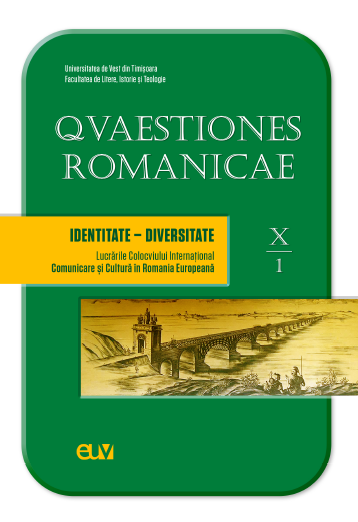Identità e diversità in alcuni scrittori italofoni: Jhumpa Lahiri, Helena Janeczek e Bijan Zarmandili
Abstract: (Identity and diversity in some Italian-speaking writers: Jhumpa Lahiri, Helena Janeczek and Mihai Butcovan) It is called migrant literature, literature of migration, multiethnic, multicultural, hybrid, syncretic literature and so on. Migrant writers come from Eastern Europe, Africa, Middle Eastern countries and even America. The present work aims to focus on three Italian-speaking migrant writers who conquer new identities through writing. They are: the American writer, of Indian origin, Jhumpa Lahiri; the German writer, of Polish-Jewish origin, Helena Janeczek and the Iranian writer Bijan Zarmandili. History offers us many examples of writers who at some point in their life start writing masterpieces in a language other than their native language. We remember the names of Samuel Beckett, Joseph Conrad or Vladimir Nabokov. The phenomenon of migrant literature begins in Italy in the nineties and at the beginning the works are mainly autobiographical and talk about the problems of those who decide or are forced to leave their homeland and have to enter a new society. Once they have mastered Italian, writers begin to diversify their style and tackle other genres as well. The fates of the writers we will focus on and their writings are examples of how the love for Italian language has led them to rediscover themselves, to acquire a new identity, to then enrich the language in which they express themselves and offer different perspectives to their Italian readers on the world and on the condition of immigrants.
Keywords: migrant literature, Italian-speaking foreign writer, identity, diversity, new perspectives.
Riassunto: È definita letteratura migrante, della migrazione, multietnica, multiculturale, ibrida, sincretica, letteratura del doppio sguardo e via dicendo. Gli scrittori migranti vengono dall’Europa dell’Est, dall’Africa, dai Paesi del Medio Oriente e anche dall’America. Il presente lavoro intende soffermarsi su tre scrittori migranti italofoni che conquistano nuove identità attraverso la scrittura. Si tratta di: la scrittrice americana, di origine indiana, Jhumpa Lahiri; la scrittrice tedesca, di famiglia ebreo-polacca, Helena Janeczek e lo scrittore iraniano Bijan Zarmandili. La storia ci offre molti esempi di scrittori che ad un certo punto della loro vita iniziano a scrivere capolavori in una lingua diversa dalla loro lingua madre. Ricordiamo i nomi di Samuel Beckett, Joseph Conrad o Vladimir Nabokov. Il fenomeno della letteratura migrante si manifesta in Italia negli anni Novanta e all’inizio le opere sono soprattutto autobiografiche e parlano dei problemi di chi decide o è costretto a lasciare la propria patria e si deve inserire in una nuova società. Una volta impadroniti dell’italino, gli scrittori iniziano a diversificare il proprio stile e ad affrontare anche altri generi. I destini degli scrittori di cui ci occuperemo e i loro scritti sono esempi di come l’amore per l’italiano gli ha portati a riscoprirsi, ad acquisire una nuova identità, per poi arricchire la lingua in cui si esprimono e offrire prospettive diverse ai propri lettori italiani sul mondo e sulla condizione di migrante.
Parole-chiave: letteratura migrante, scrittore straniero italofono, identità, diversità, nuove prospettive.
